编制机构:雅昌艺术市场监测中心(AMMA)

“表象与意志”顾黎明艺术展
APPARITION AND WILL:
GU LIMING'S ART EXHIBITION
回溯中国艺术历程,上世纪80年代末于中国美术馆举办的“中国现代艺术展”是绕不开的重要节点事件。在大量西方话语的涌入下,在中国当代艺术发展思想最敏锐、革新最迅猛的时期。顾黎明作为参与“中国现代艺术展”,中国当代艺术最早期的实践者之一,他以深厚的学养、敏锐的觉察,更早地从一片没有回音的空旷中寻得个人意志的立场,重新找到艺术再生的理由。
“85”新潮尾声,顾黎明于中国美术报上先后发表了《写在上海今日艺术展之后》及《今日抽象艺术》文章,以回应栗宪庭对“纯化语言”的批判,论述了建立中国艺术本体语言的重要性,奠定顾黎明艺术思想体系的开端。而他学者型艺术家的特质,也在此后数十年的实践探索中不断显现。顾黎明在“问题意识”“艺术本质”“传统的转换”等论题上,都提出过鲜明观点并不断钻研。正如他对自身艺术历程的总括——“期望能够帮助中国当代艺术建构当代图像的历史观”。
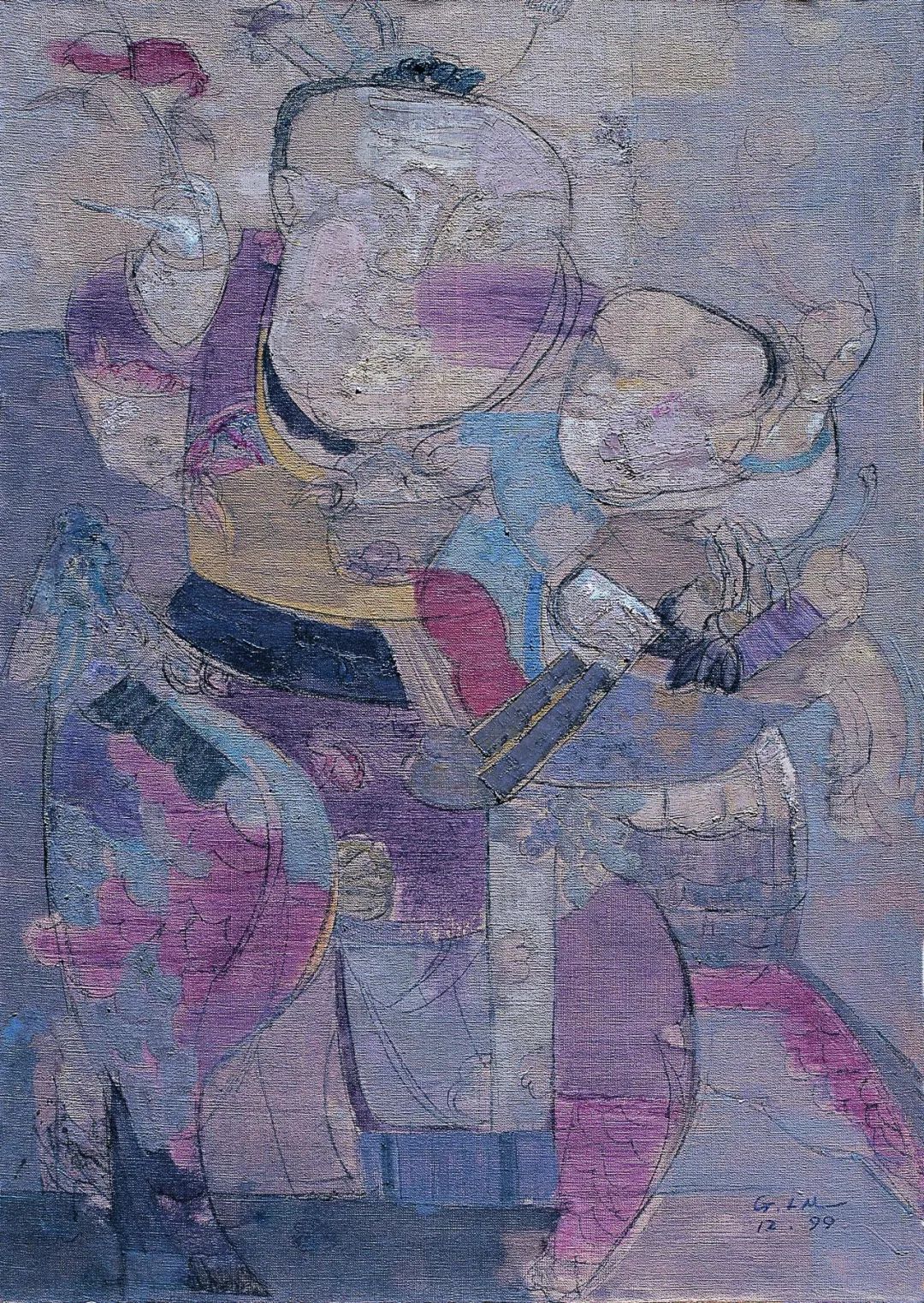
[《麒麟送子 - 线版·蓝色版》1999 / 116×80cm / 布面油彩]
Qilin Blessing with Children:Line and Blue Color
1999 / 116×80cm / Oil on Canvas
有别于很多艺术家刻意地追求“风格”和“个人符号”,顾黎明力图摆脱观念的巢穴,站在批判和反思的角度,通过更深层次地剖析历史与当代之间矛盾冲突的心理感受痕迹,提出真正具有时代性的问题。他曾表明,“观念的抽象、艺术的形态和语言不能仅仅停留于一种形式,而应该和现实文化发生关系,这种与现实文化的关联,必须和我们的历史境遇紧密相连。”正是这种问题意识,推动他开启了从“马王堆”到“山水赋”等一系列长达三十多年的创作实践。
细述顾黎明的艺术道路,就是一个不断自我建构,不断探索传统文化资源的当代性转换,试图对传统文化记忆和历史意识在当代文化语境中进行重建的过程。无论是对传统色彩系统,如壁画、民间版画、山水画等的解构与重构,或是沿用富含东方韵味的线条落成作品的抽象痕迹,或是将依附于精神文化形态的传统符号提纯为抽象艺术语言,完成对中国古老艺术的现代转型与传承新生……顾黎明独有的意志驱动力,广泛地表现在他的各系列作品当中。

[《山水赋 - 四门塔之一》2024 / 390×200cm / 布面丙烯、油彩、宣纸拓印及拼贴等]
Shanshuifu-Simen Tower No.1
2024 / 390×220cm / Acrylics and Oil on Canvas, Stone Rubbing on Rice Paper, Collaging and etc
因而,以“表象与意志”为题,我们很荣幸将于2024年3月16日开启“顾黎明艺术展”。展览将展出艺术家各系列重要作品,包括油画、水彩、版画、陶艺、综合材料及装置等,横跨顾黎明艺术创作实践变化的整个历程,一瞥顾黎明“表象与意志”世界的掠影。此外,区别于此前艺术家的所有展览,本次将首度展出艺术家的大量手稿,为观众理解顾黎明及其艺术创作道路增添一个全新维度。看意志如何逡巡于顾黎明的“未完成”状态,最终作用于其“创作表象”。历史与现实的关照,内与外在的联系等,意志的触角作用于真实世界的路径,相信都能从手稿中得到线索。而借由“顾黎明”这样一个独到的个体,通过梳理、追溯其个人创作和思想演进的历程,亦为我们铺开中国当代艺术发展史中的鲜活一页。
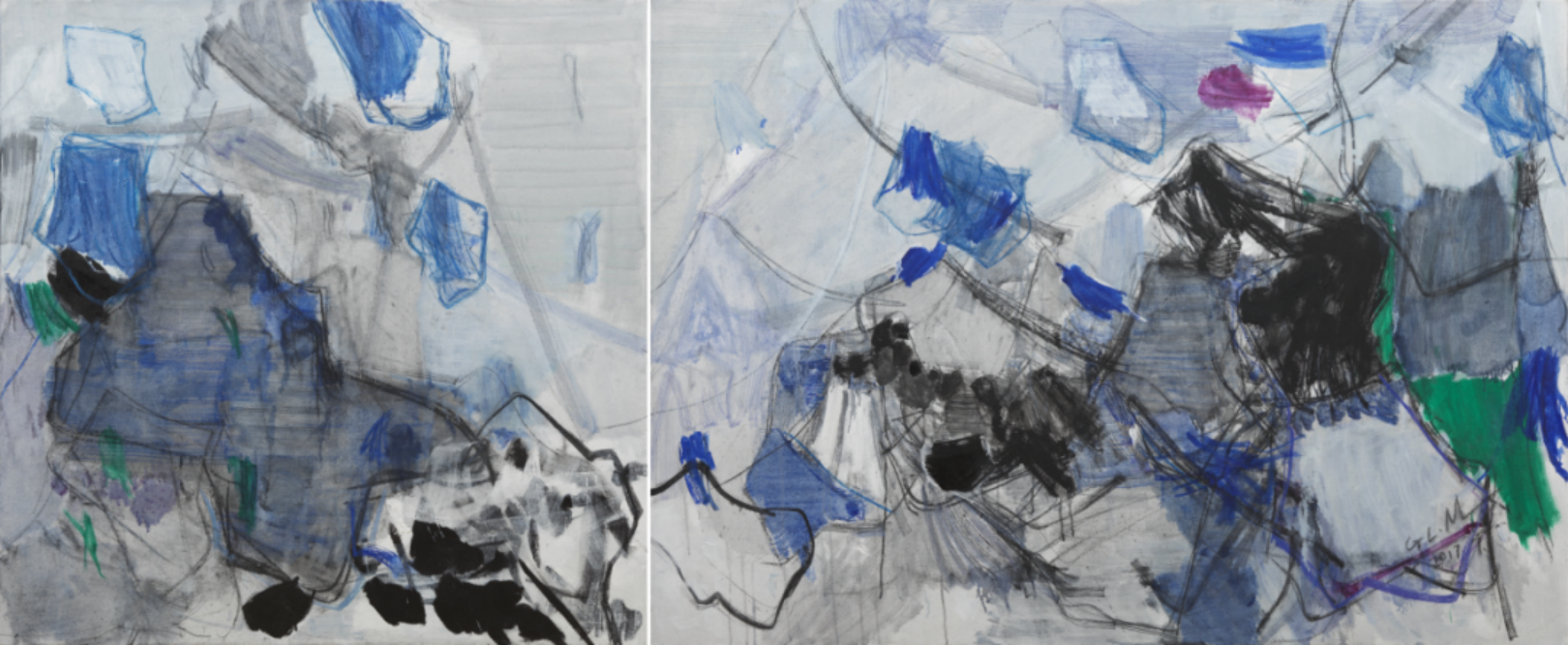
[《山水赋 No.29》2017 / 276×114cm / 布面油彩、丙烯]
Shanshui Fu No.29
2017 / 276×114cm / Oil, Acrylic on Canvas
Looking back on the course of Chinese art, the "Chinese Modern Art Exhibition" held at the National Art Museum of China in the late 1980s stands out as a crucial milestone. With the influx of numerous Western concepts, contemporary Chinese art experienced a period of sharp intellectual insight and rapid innovation. Gu Liming, one of the earliest practitioners of contemporary Chinese art and a participant in the "Chinese Modern Art Exhibition," demonstrated profound erudition and acute perception. He managed to find his personal stance amidst a vast echoless void, thus rediscovering the reasons for the rebirth of art.
At the end of the "85 New Wave" movement, Gu Liming responded to criticism from Li Xianting regarding the "purification of language" by publishing articles titled "Reflections on the Shanghai Art Exhibition Today" and "Abstract Art at Present" in the Art News of China . In these writings, he discussed the importance of establishing the inherent language of Chinese art, laying the foundation for his artistic ideology. Throughout decades of practical exploration, his qualities as a scholarly artist continued to manifest, and has presented distinct viewpoints and delved into topics such as "consciousness of problems", "the essence of art", and "transformation of tradition" one after another. As he summarized his artistic journey, "I hope to help construct a contemporary view of history for Chinese contemporary art."
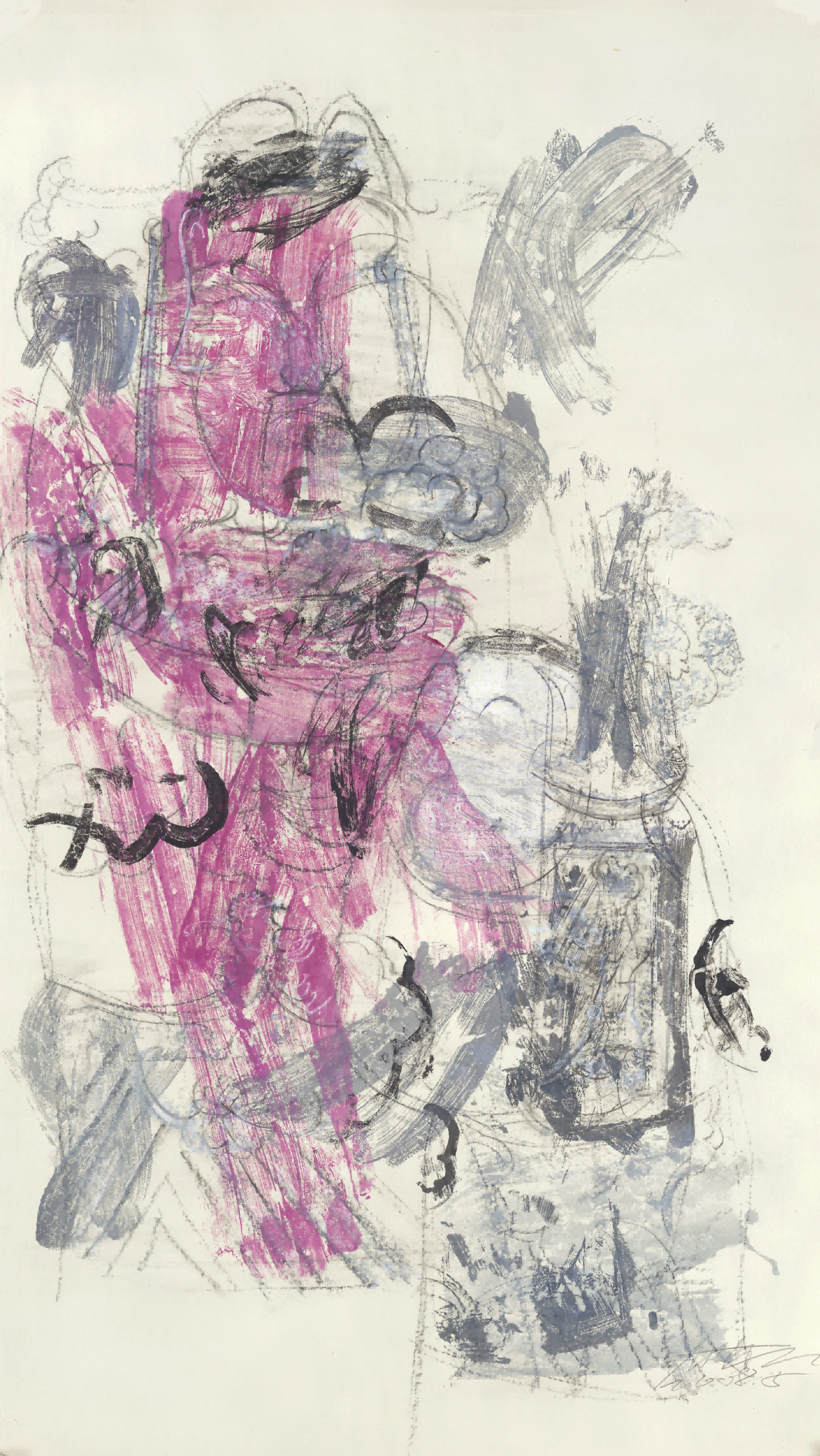
左:[《平安如意》2008 / 115×66cm / 纸本丙烯]
Left:Blessed with Peace and Prosperity
2008 / 115×66cm / Acrylic on Paper
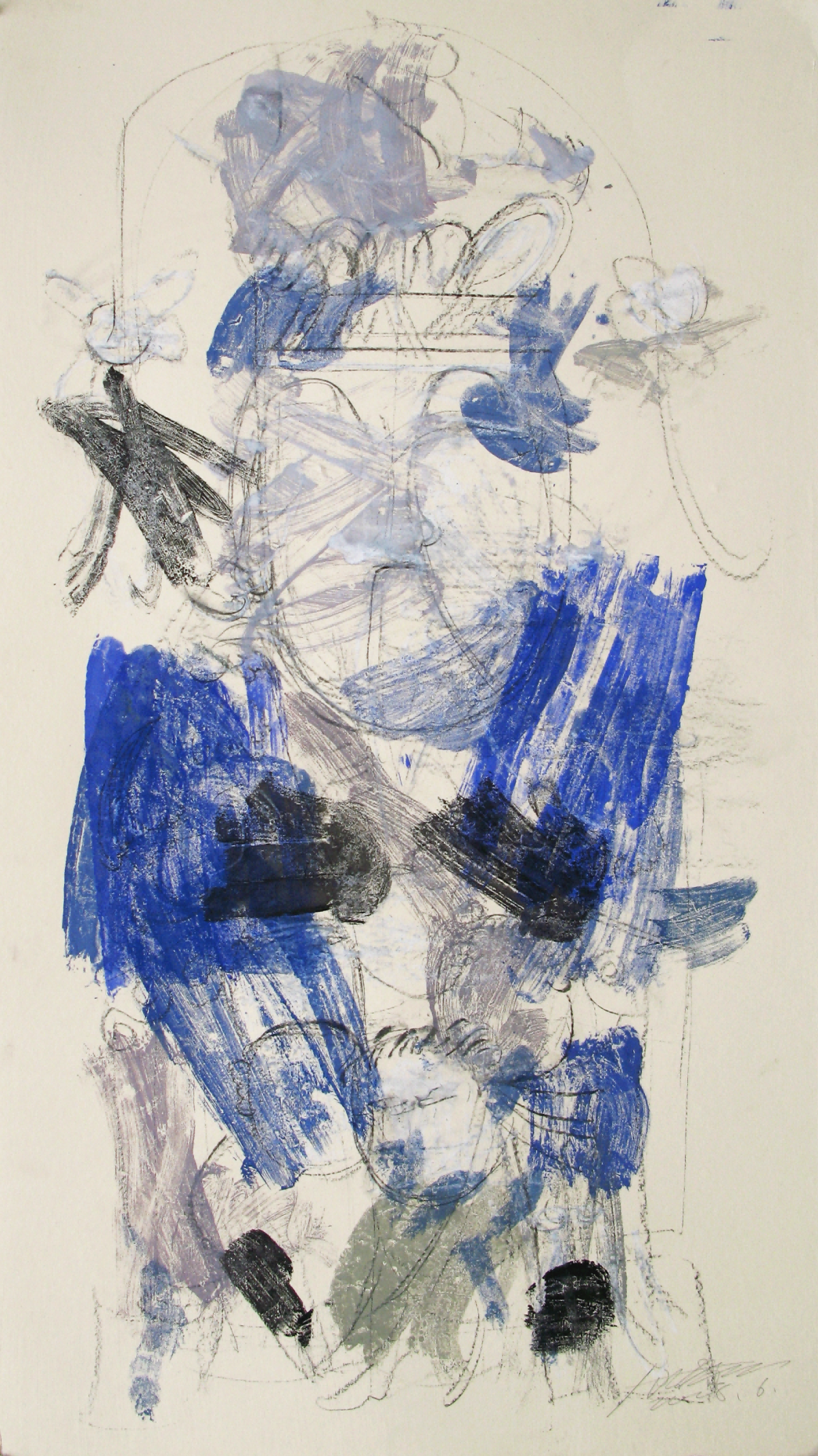
中:[《灶神》2008 / 115×66cm / 纸本丙烯]
Center:Kitchen God
2008 / 115×66cm / Acrylic on Paper
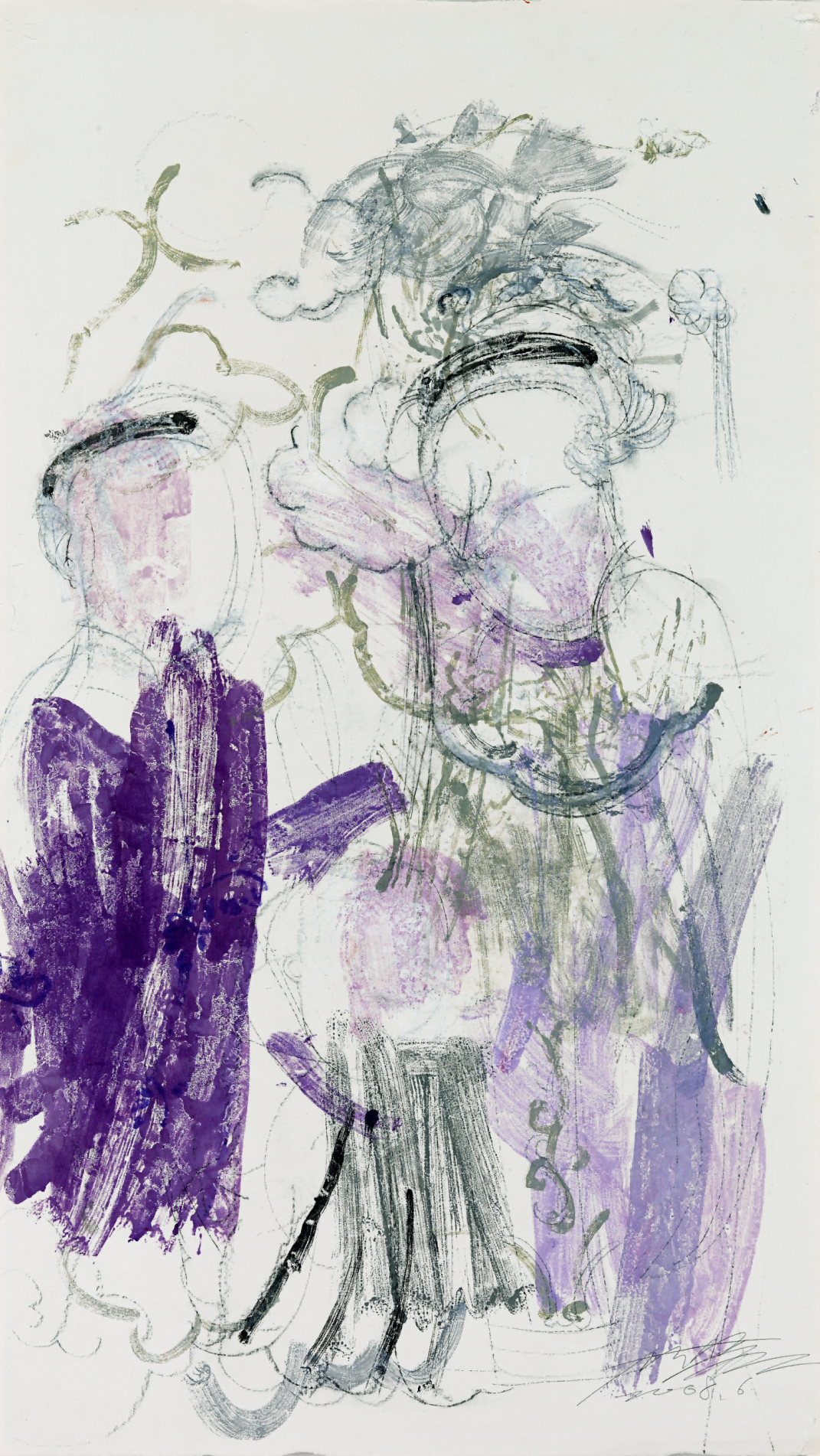
右:[《天仙送子》2008 / 115×66cm / 纸本丙烯]
Right:Heavenly Fairy Blessing with Children
2008 / 115×66cm / Acrylic on Paper
In contrast to many artists who consciously pursue "style" and "personal symbols," Gu Liming strives to break free from conceptual constraints. He stands from a critical and reflective perspective, delving deeper into the psychological traces of conflicting emotions between history and the contemporary era, then poses genuinely timely questions rather than merely conforming to predefined notions. Gu Liming believes that abstract concepts, artistic forms, and language should not remain stagnant but must engage with real cultural contexts. This connection with reality must be closely intertwined with our historical circumstances. It's this sense of inquiry that propels him through a creative journey spanning over thirty years, from works like "Han·Mawangdui" to "Shanshui Fu".
Gu Liming's artistic path is a continuous process of self-construction and exploration of the contemporary relevance of traditional cultural resources. He endeavors to reconstruct the memory of traditional culture and historical consciousness within the context of contemporary culture. Whether deconstructing and reconstructing traditional color systems like murals, Chinese folk prints, and landscape paintings, or infusing abstract traces into works with an Eastern aesthetic, or refining traditional symbols embedded in spiritual and cultural forms into abstract artistic language, he achieves a modern transformation and revitalization of traditional Chinese art. Gu Liming's unique driving force is widely evident across his various series of works.
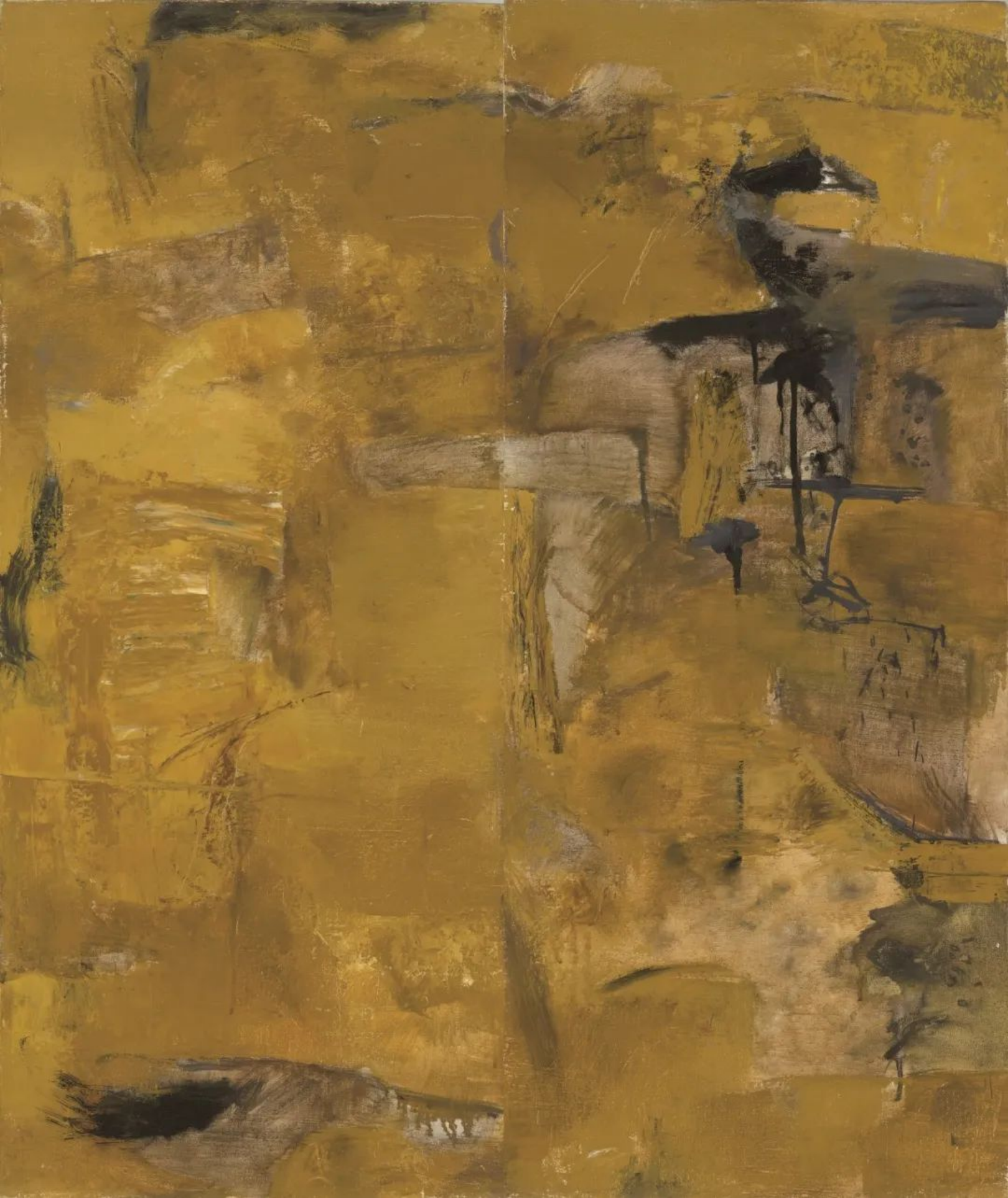
[《汉 - 马王堆 No.2》1991 / 95×80cm / 布面油彩]
Mawangdui Han Tomb No.2
1991 / 95×80cm / Oil on Canvas
Therefore, under the theme of "Apparition and Will", we are honored to present the "Gu Liming's Art Exhibition" starting on March 16, 2024. The exhibition will feature significant works from various series by the artist, including oil paintings, watercolors, prints, ceramics, mixed media, and installations, spanning the entire evolution of Gu Liming's artistic practice. It offers a glimpse into the world of "Apparition and Will" that Gu Liming embodies.
In addition, unlike previous exhibitions, this one will debut a large number of the artist's manuscripts, adding a new dimension for audiences to understand Gu Liming and his artistic journey. Observing how the will navigates through Gu Liming's "unfinished" state, ultimately influencing his "creative apparition", one can discern clues about the interplay between history and reality, the connection between the internal and external, and understand the path will affects the real world. Through an unique individuals like "Gu Liming" and by tracing his personal creative process and intellectual evolution, we unfold a vivid page in the development history of Chinese contemporary art.
门神系列
Door Gods Series
中国民间传统杨家埠木刻版画,素以印制门神闻名,渐成典型中国符号。顾黎明借用年画中的门神,来造油画的中国意趣,形成他所特有的活生生的门神意写。 传统的门神印制,数版叠印,往往于不经意处溢出某种生趣,整体上总有不事修辞的修辞妙意,他似乎从这里窥见了一种神,一种快意相凝的神。顾黎明领会了其间意态转换的奥妙,大胆地将门神的形开解,用稀薄、浓烈的色与犀利、错综的线,相衬相隐,拆解又重织,试图表达现实生活经验过程中的精神期许。在反反复复地重复中,把握画意随机的瞬间,生意生情,并渐渐凝为一种门神之新神,自开一类油画表现的新神。
Yangjiabu woodprints, a traditional Chinese folk art known for printing door gods, have become typical Chinese symbols. Gu Liming cites the door gods from New Year prints to create a Chinese aesthetic in oil painting, forming his unique and vivid depiction of door gods. Traditional door gods are printed in multiple layers, often displaying a spontaneous charm in unexpected places. Overall, there is an eloquence without deliberate rhetoric. It seems that he glimpses a kind of deity, a deity of contented joy. Gu Liming grasps the subtlety of the transformations in their expressions and boldly interprets the forms of the door gods, juxtaposing and concealing them with thin and intense colors, as well as sharp and intricate lines. He deconstructs and reconstructs, aiming to express the spiritual expectations in the process of experiencing real-life experiences. Through repeated weaving, capturing the fleeting moments of artistic intention, it gradually congeals into a new deity of door gods, creating a new realm of oil painting expression.
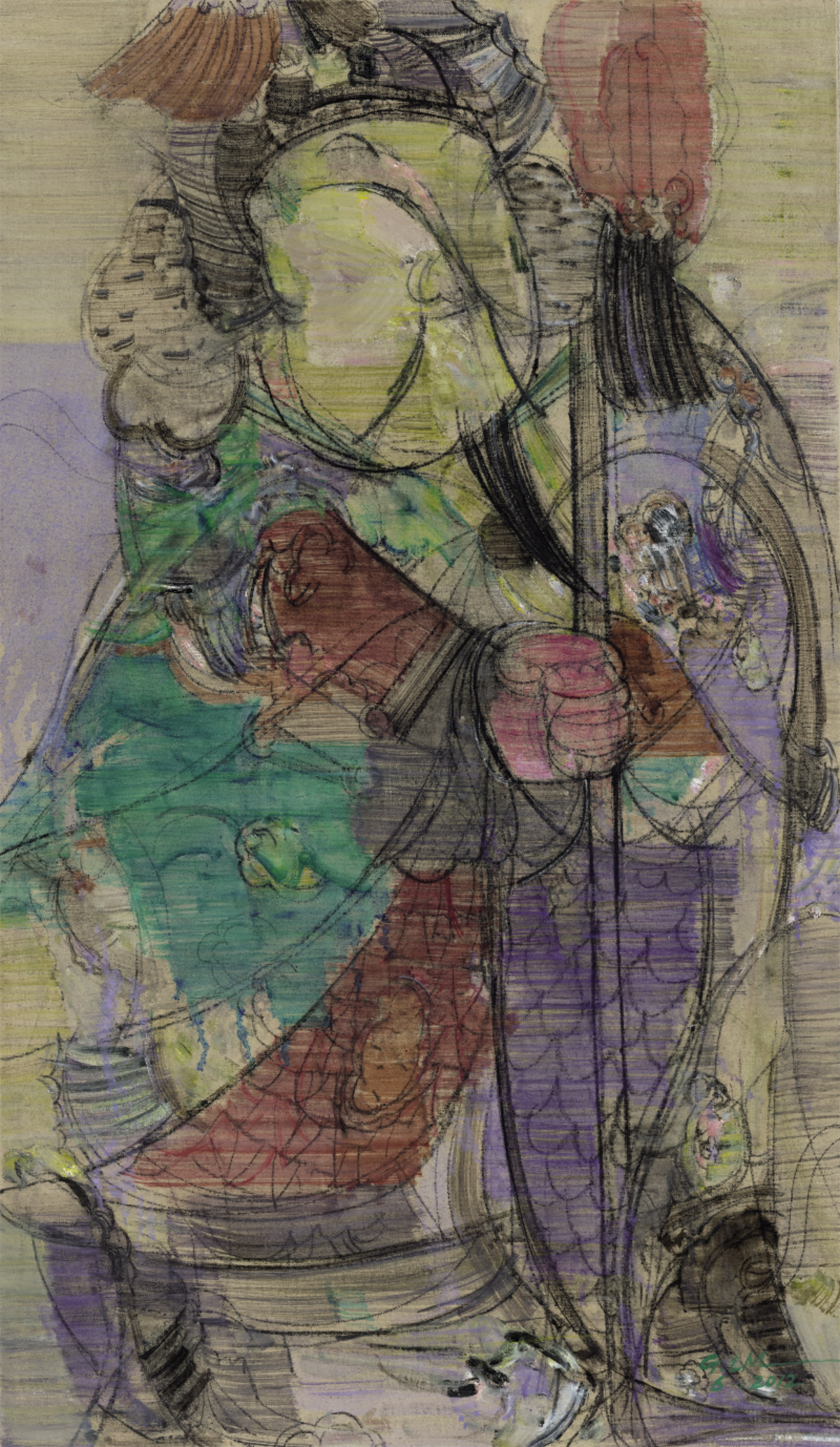
[《持锤门神》2012 / 110×64cm / 布面油彩]
Door God with Hammer
2012 / 110×64cm / Oil on Canvas
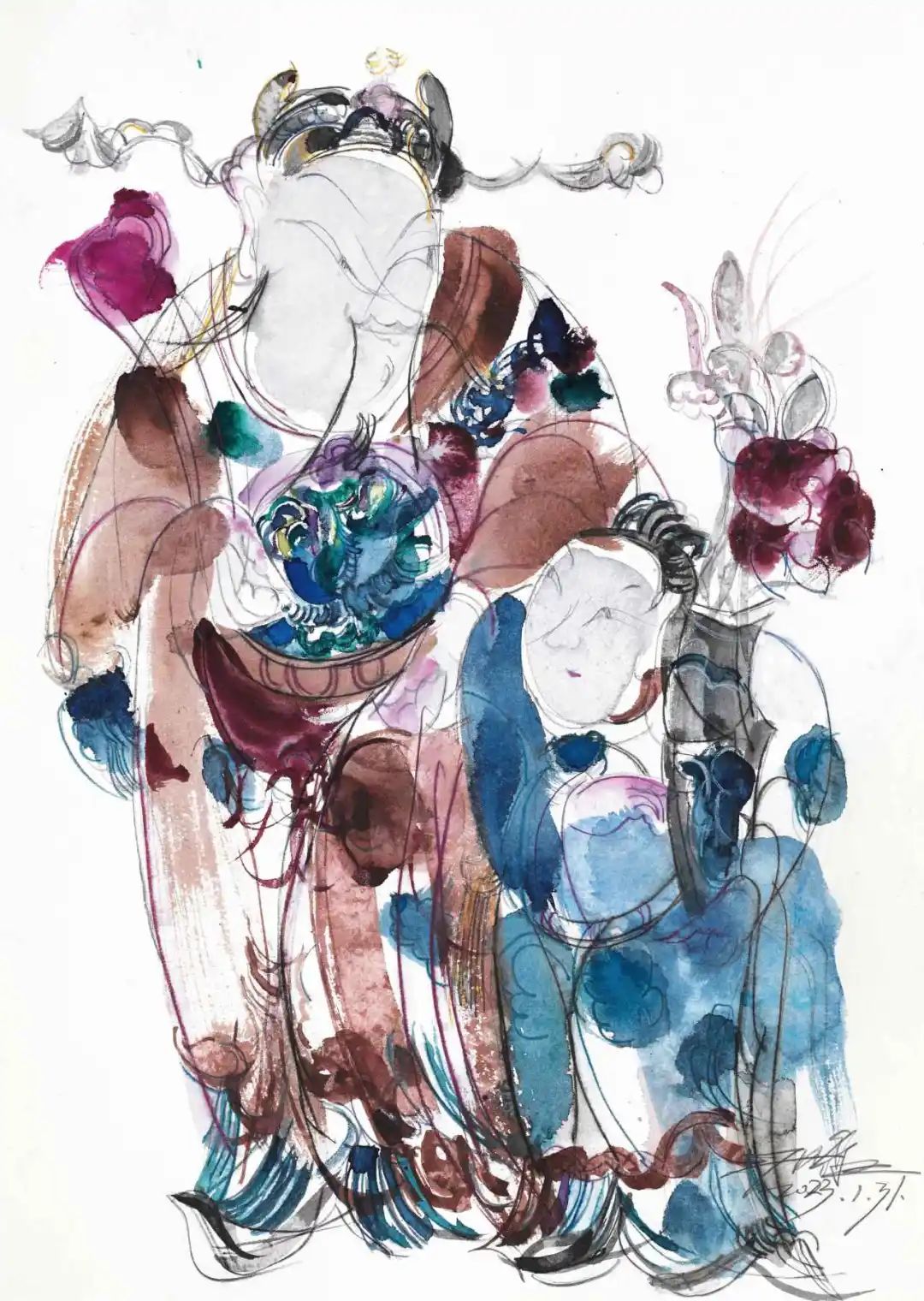
[《吉祥如意 No.3》 2023 / 42×29.7cm / 纸本水彩、色粉]
Good Fortune and Prosperity Come True No.3
2023 / 42×29.7cm / Watercolor and Pastel on Paper
山水赋系列
Shanshui Fu Series
顾黎明关注的人与自然的关系,借五代荆浩山水画理,表达传统与现代,人与自然之间存在的问题,他借汉魏六朝的“赋”兴情怀,表达“山水赋”之胸襟,半隐半现地呈现出人对自然环境的两种情怀。在这个系列创作期间顾黎明还开始尝试融入民艺撕纸的方式拼贴画面。无论是山的形象还是水的律动,都蕴含着中国传统文化艺术带给他的灵感和滋养,在交织的线条和色彩中,通过笔触与色彩触发纸性的内在魂魄,生成多意切换空间。正如自己所言:“这些痕迹可以勾起我们对历史情怀的眷恋,同样也能够反映我们现实的境遇”。
Gu Liming focuses on the relationship between humans and nature, drawing inspiration from the landscape paintings of Jing Hao from the Five Dynasties (Wu Dai) period. He expresses the issues of tradition and modernity, as well as the coexistence of humans and nature. Drawing from the “fu” of the Han and Wei Dynasties, as well as the Six Dynasties (Liu Chao), he conveys the broad-mindedness of “Shanshui Fu” while presenting the dual emotions of human beings towards the natural environment. During the creation of this series, Gu Liming also began to incorporate the collage technique of folk paper tearing. Whether it is the imagery of mountains or the rhythm of water, it carries the inspiration and nourishment derived from Chinese traditional cultural art. Through interwoven lines and colors, the brushstrokes and colors trigger the intrinsic essence of paper, creating a space of multiple interpretations. As he stated, “These traces can evoke our nostalgia for historical sentiments and, at the same time, reflect our current situation.”
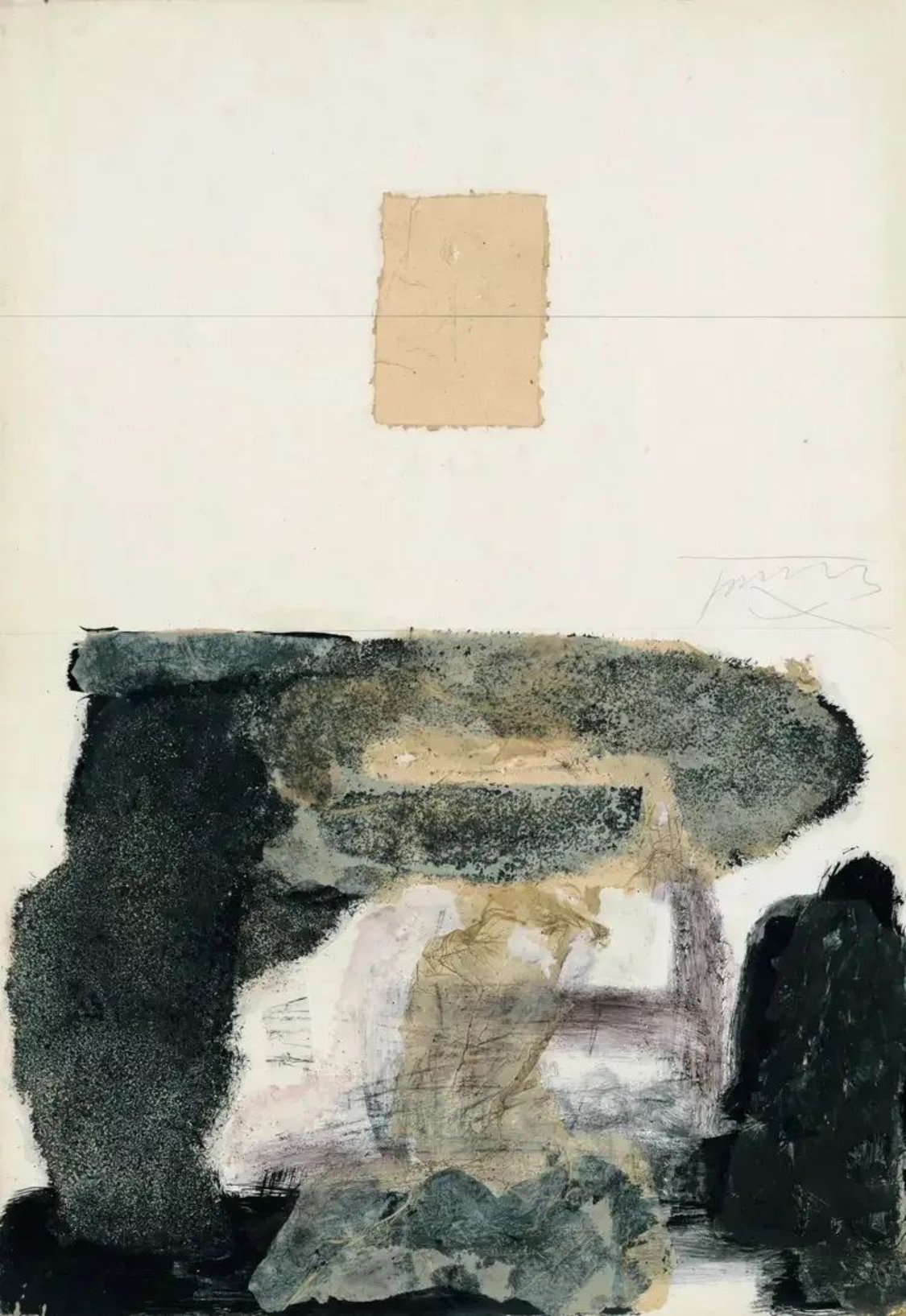
[《山水》1990 / 78.5×55cm / 卡纸上色粉笔、油彩、及宣纸拼贴等]
Shan Shui
1990 / 78.5×55cm / Pastel, Oil and Rice Paper Collage, etc. on Paperboard
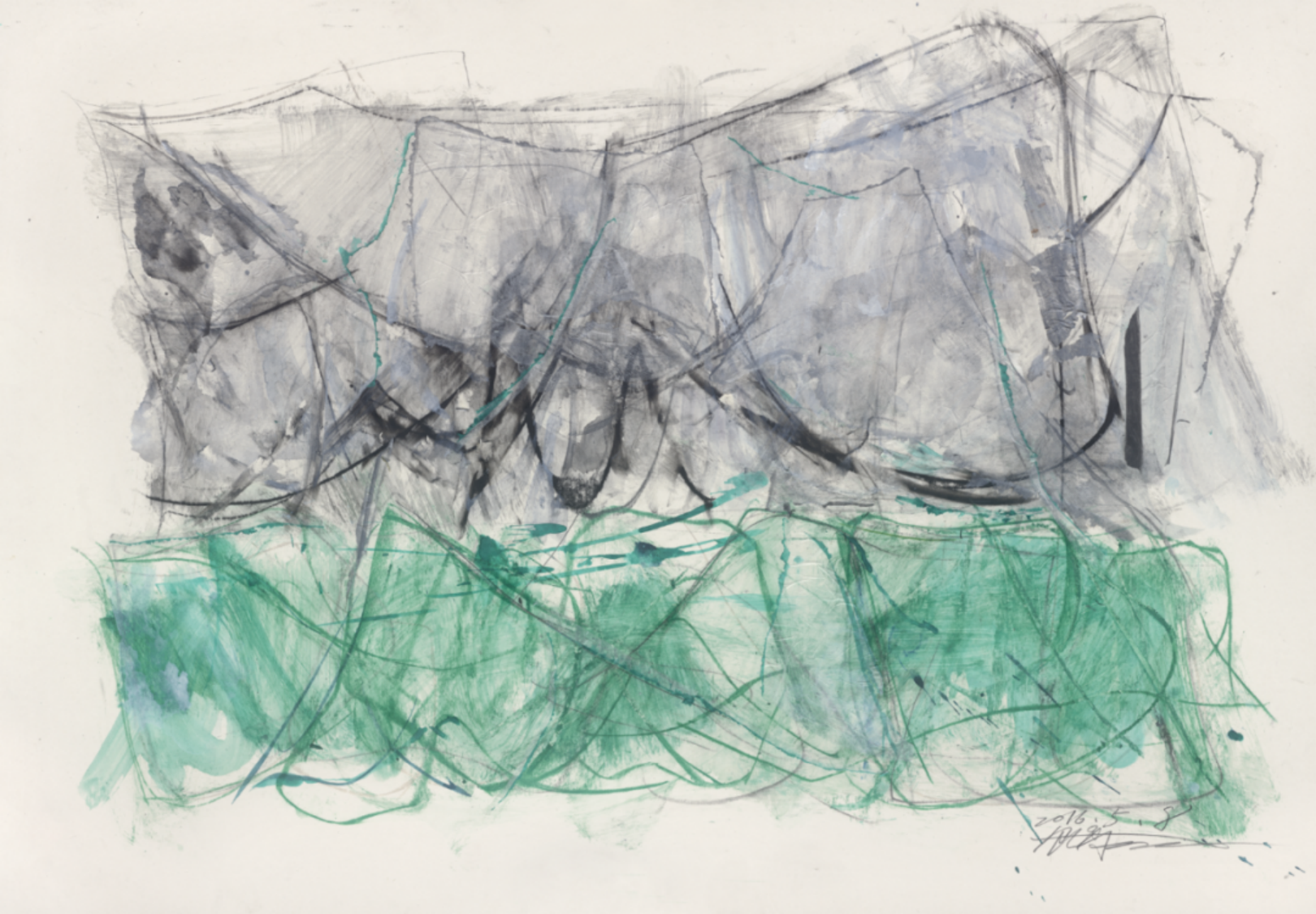
[《山水赋 No.18》 2016 / 75×46.5cm / 卡纸上色粉、水彩、铅笔及蜡纸拼贴等]
Shanshui Fu No.18
2016 / 75×46.5cm / Pastel, Watercolor, Pencil, Wax Paper Collage, etc. on Paperboard
汉·马王堆系列
Han Mawangdui Series
汉代人以理想化的方式构建了天、地、人三位一体的宇宙观。 在中国古人的阴阳哲学的观念中,作为万物灵长之首,人是一个魂与魄、神与形的结合体。汉代马王堆汉墓中被封存了二千多年的历史陈遗址的视觉感受深深吸引了顾黎明,引领他到达一个被忽视已久的传统民间的艺术世界。在这里,古老的宇宙观和生命观所决定的画面程式和意象,东方的色彩观念,散点透视组成的丰富空间,恒久凝固的时间意识,等级化的秩序,以奇异的魔力俘获了顾黎明的全部想象。并非这一考古发现使那些痛苦思考的问题有了一个答案,而是顾黎明在此探寻到一种回答,如何通过传统的秩序和现实的内在感觉重建当代艺术问题的可能性。
During the Han Dynasty, people constructed a unified cosmic view of heaven, earth, and humanity in an idealized manner. According to the Yin-Yang philosophy of ancient China, as the chief among all living beings, humans are a combination of soul and body, spirit and form. The visual experiences preserved on the historical artifacts sealed in the Han Dynasty Mawangdui tombs deeply attracted Gu Liming, leading him to explore a long-overlooked traditional folk art world. Here, the composition and imagery determined by the ancient cosmic and life perspectives, the Eastern concept of colors, the rich space formed by scattered perspectives, the enduring sense of time frozen, and the hierarchical order captivated Gu Liming’s entire imagination with a peculiar charm. It was not the archaeological discovery that provided answers to the questions of painful contemplation, but rather, Gu Liming found a way to seek answers here, exploring the possibility of reconstructing contemporary art issues through the traditional order and the inner sense of reality.
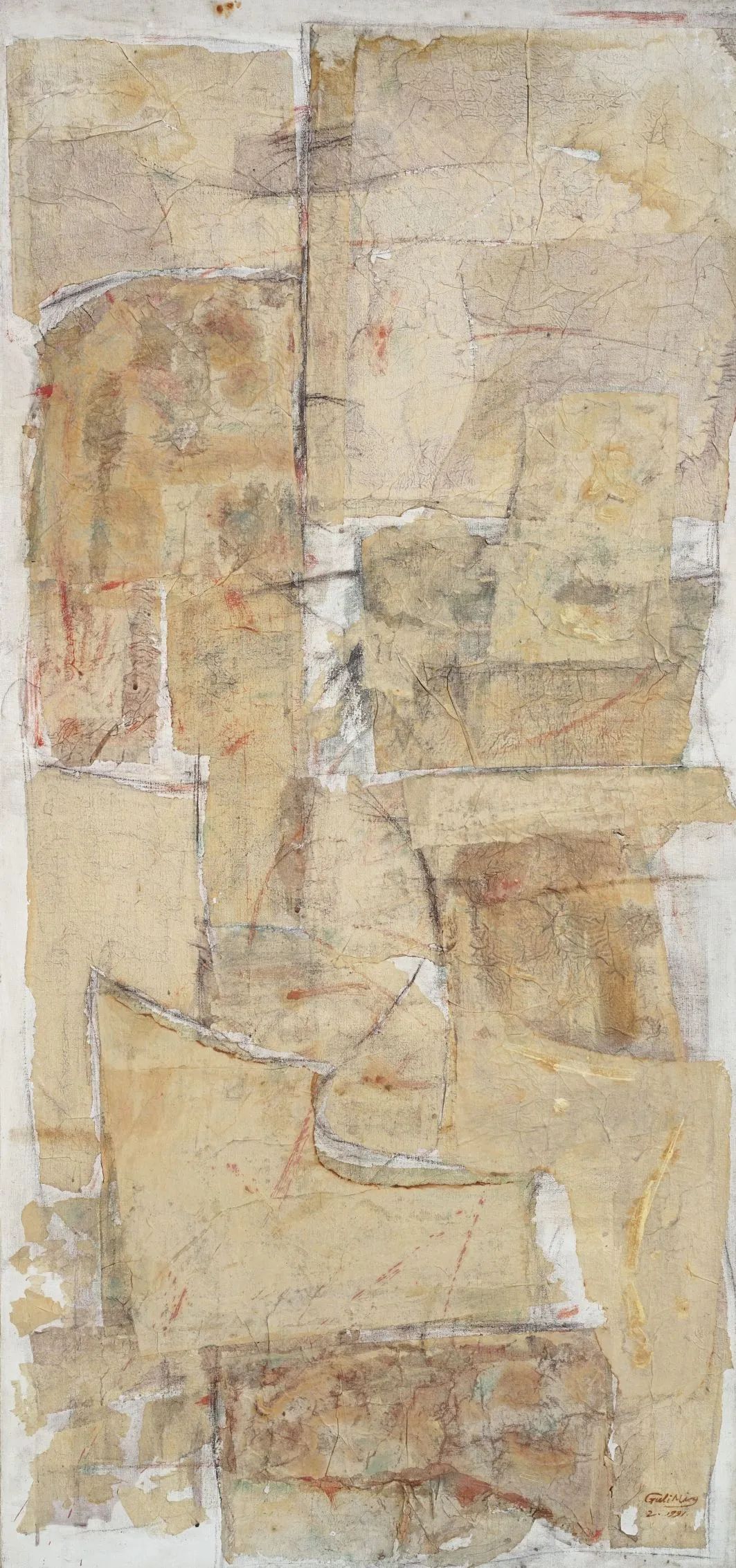
[《汉·马王堆服饰 No.10》1991 / 121×56cm / 布面油彩、宣纸等]
Apparel from Mawangdui Han Tomb No.10
1991 / 121×56cm / Oil, Rice Paper, etc. on Canvas
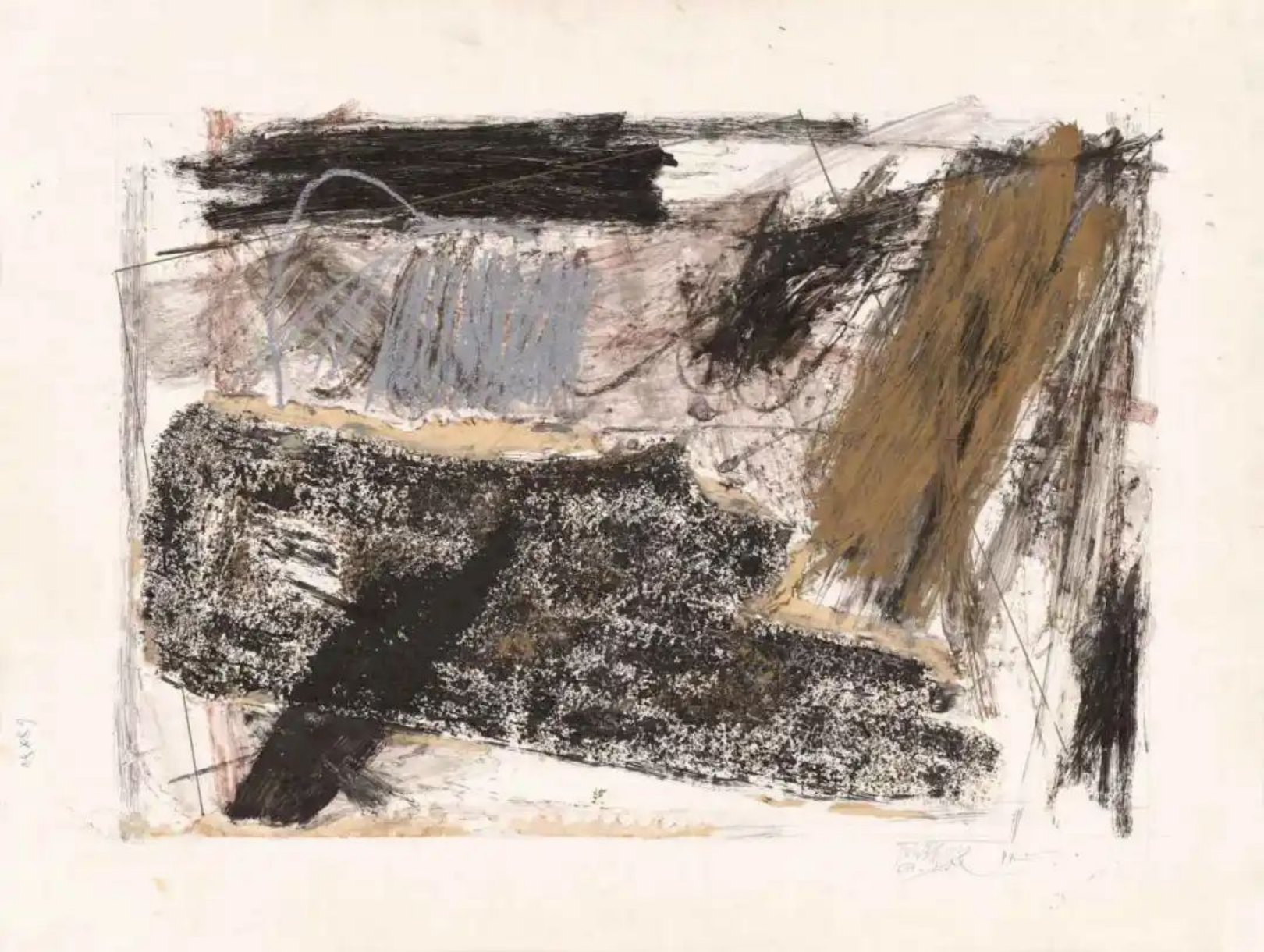
[《方格变化之三》 1992 / 37.5×50cm / 纸本色粉笔、油彩、树脂胶等]
Changes of Squares No.3
1992 / 37.5×50cm / Pastel, Oil, Resin Adhesive, etc. on Paper
佛造像系列
Buddha Statue Series
传统佛造像是宗教情感的艺术创作活动。顾黎明的佛造像摹写神态安详、静穆、崇高,气质超然。他既呈现了他们历史岁月的印记和沧桑,又传递了真实的人性痕迹。在他看来,现代人既是传统又现代的矛盾复合体,他把人们所理解的视觉和心理的变化用一种抽象性方式表现出来,目的则是为了获取更多的物象本质。他所要表达的显然不是习作本身,而是一种文化的观念,透过所表现的青州古代龙兴寺北齐、北魏的佛像,让人们看到某种历史和现实的情感纠结与冲突下,残留的个体经验的感觉痕迹。这个系列和他对历史与现实遭遇的认知态度有着必然的逻辑关系。
Traditional Buddha statues are artistic creations imbued with religious sentiments. Gu Liming depicts the serene, tranquil, and sublime demeanor of the Buddha statues, reflecting both the imprints and vicissitudes of history while conveying traces of genuine human emotions. In his view, modern individuals embody the contradiction and complexity of both tradition and modernity. He abstractly represents the visual and psychological changes understood by people, with the aim of capturing the essence of objects. Clearly, he intends to convey not just the composition itself but a cultural concept, allowing people to perceive the lingering traces of individual experiences amidst the emotional entanglement and conflicts of a certain history and reality, as depicted through the ancient Buddha statues of the Northern Qi and Northern Wei dynasties at the Longxing Temple in Qingzhou. This series has a logical connection to his cognitive attitude towards the encounters of history and reality.
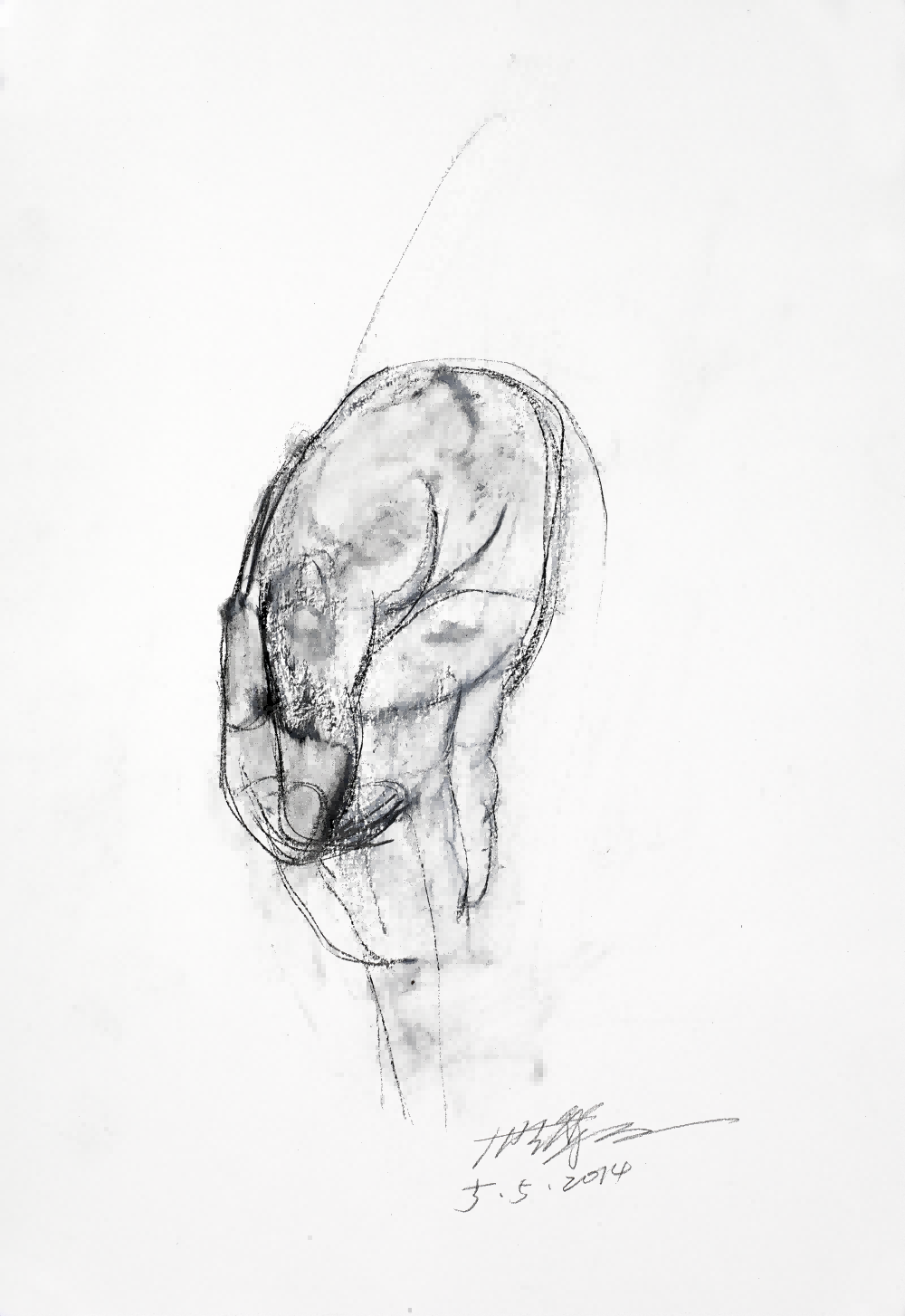
[《北齐 - 佛手》2014 / 39×27cm / 纸上色粉、铅笔]
Northern Qi Dynasty: Hands of Buddha
2014 / 39×27cm / Pastel and Pencil on Paper
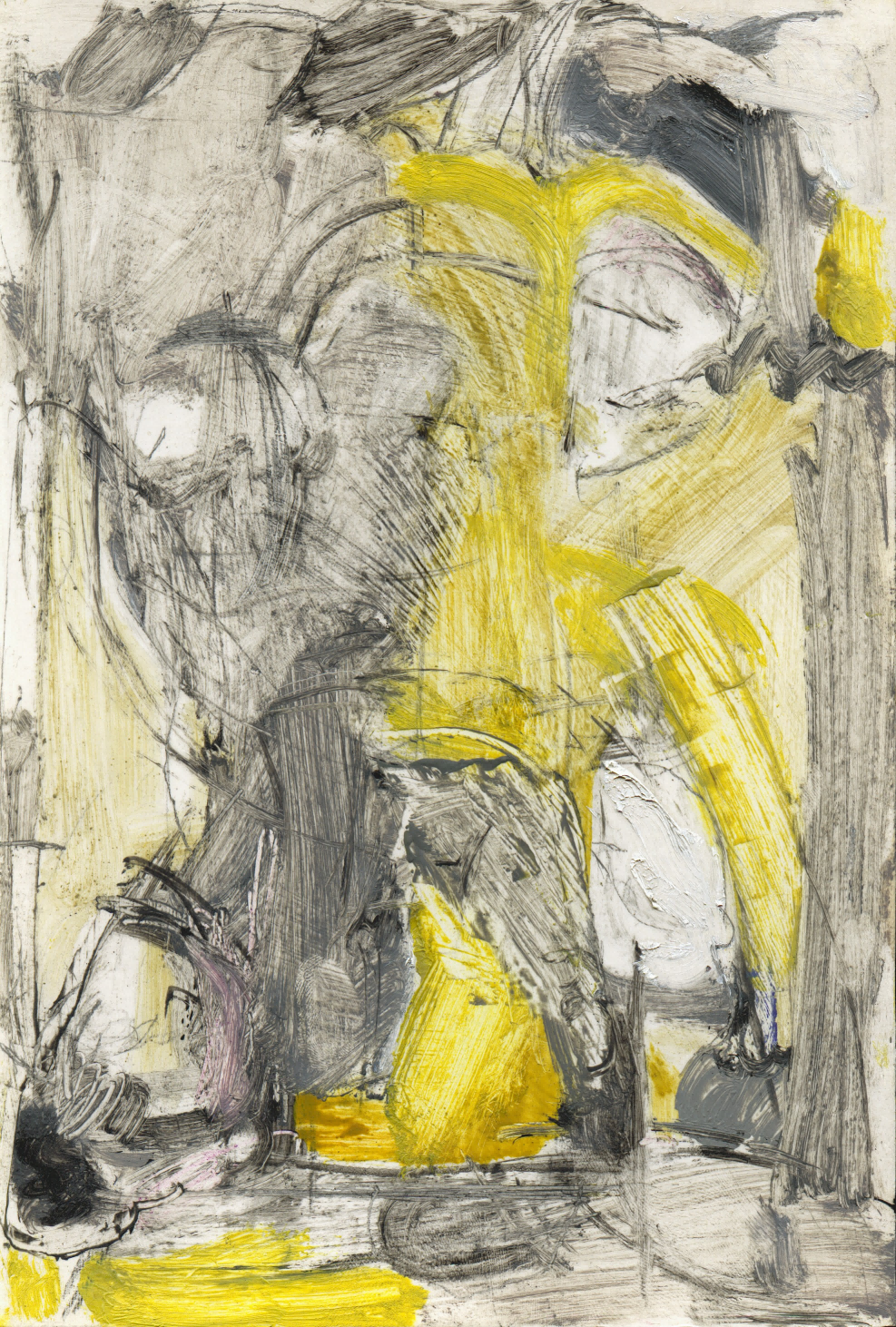
[《敦煌草图十二》2001 / 27×16.8cm / 纸板上油彩、色粉等]
Dunhuang Sketch No.12
2001 / 27×16.8cm / Oil, Pastel, etc. on Paperboard
「 表象与意志:顾黎明艺术展 」
展期:2024.3.16-6.16
开放时间:周二至周日 9:00-18:00
展览地点:厦门红顶当代艺术中心A馆
主办方:红顶当代艺术中心
联合主办:顾黎明工作室
出品人:陈丹妮
策展人:徐烜
艺术总监:申晨
品牌宣传:方思梦
展览统筹:唐文
展览执行:黄维
平面设计:石祥甫
鸣谢
顾黎明工作室团队:
杨浩/郭浩南(翻译)/骆睿扬/顾文璟/张天助
红顶当代艺术中心团队:
唐文/方思梦/黄维/石祥甫/陈少哲/叶冠麟/俞燕
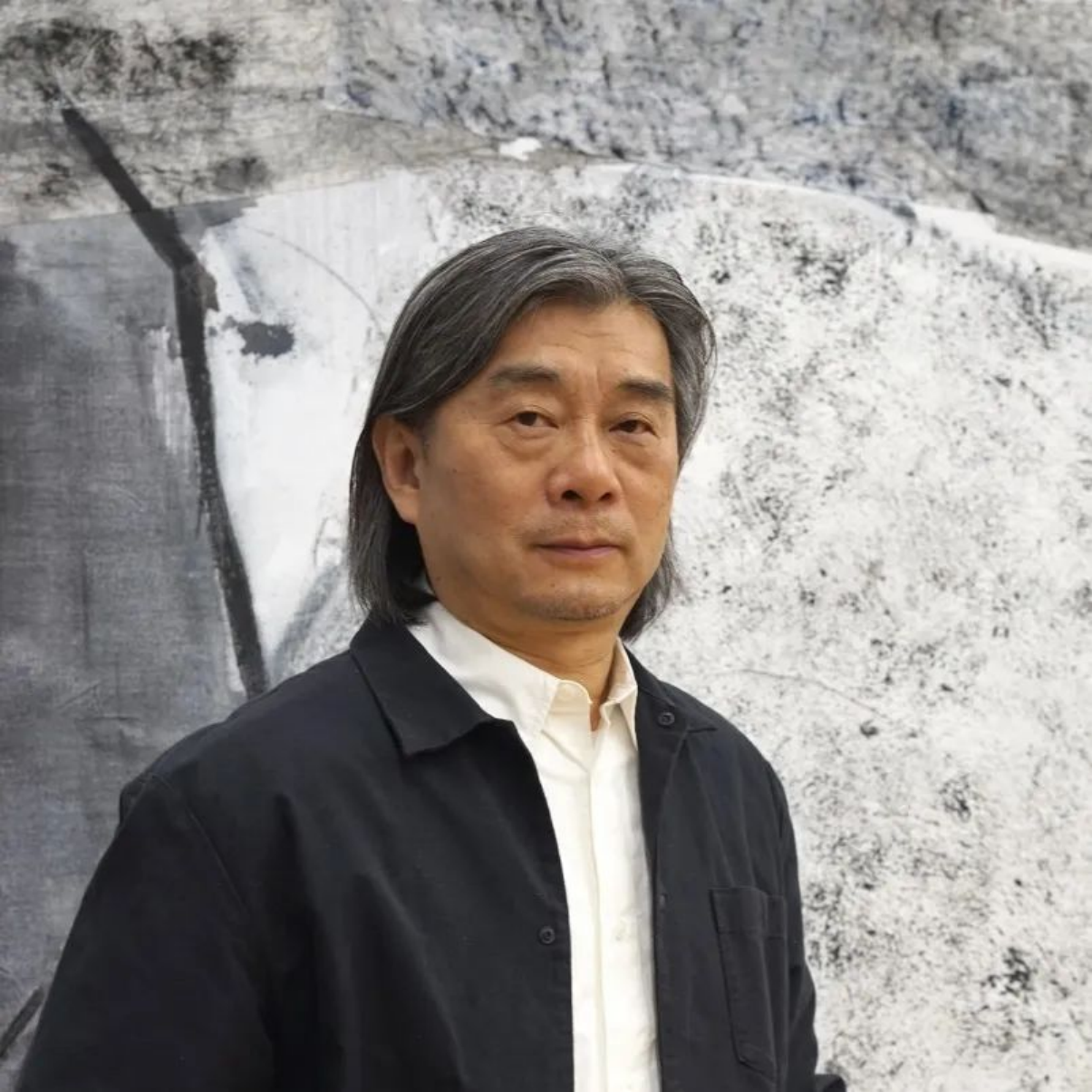
顾黎明
Gu Liming
1963年生于山东潍坊。曾任教于山东艺术学院、中国美术学院;2009年获中国美术学院油画专业博士学位。现为清华大学美术学院教授、博士生导师,中国美术家协会油画艺术委员会委员,中国油画学会理事,中国国家画院研究员。
获奖:
"中国油画双年展"学术奖(1993),"第八届全国美展"奖(1994);"研究与超越-中国小油画大展"艺术奖(2001),"凤凰艺术年展"凤凰艺术奖·最佳抽象表现绘画艺术奖(2017),"维也纳国际艺术勋章-杰出艺术家勋章"(2020)。
收藏:
中国美术馆、上海美术馆、香港大学博物馆、山东美术馆、山东博物馆、北京大都油画艺术馆、中国美术学院、深圳市罗湖美术馆、武汉汤湖美术馆、四川美术学院美术馆、国家大剧院、中国国家博物馆、台湾索卡艺术中心、台湾长流美术馆、清华大学美术学院美术馆等国内外艺术机构收藏。
个展:
1989年3月在联邦德国THE GALLERY OF WERNER MELLETIN举办个展(科隆)
1996年-2000年举办"顾黎明作品展"(台北索卡艺术中心)
2002年12月举办"转换的传统--顾黎明作品展"(北京索卡国际艺术中心)
2009年3月举办"门神与花境--顾黎明、王海燕近作展"(济南南左右当代艺术馆)
2010年9-12月举办"顾黎明、王劼音作品展"(上海和辉艺术中心)
2012年1月举办"传统的转换--顾黎明绘画作品展"(深圳雅昌艺术馆)
2013年11月举办"传统·再生--顾黎明绘画作品珍藏展"(北京索卡艺艺术中心)
2015年7月举办"门神·花境--顾黎明、王海燕油画作品展"(香港大会堂)
2015年10月举办"执纸转承--顾黎明1985-2015纸上绘画作品展"(北京798方圆美术馆)
2016年 9月举办"借喻--顾黎明纸本作品展"(深圳罗湖美术馆)
2016年11月举办"借喻·顾黎明艺术三十年"巡回展(山东博物馆,清华大学美术学院美术馆,潍坊市美术馆)
2017年 8月举办"从马王堆到山水赋--顾黎明艺术作品展"(北京索卡艺术中心)
2019年 9月举办"山水赋--顾黎明作品展"(湖北汤湖美术馆)
2023年10月举办"顾黎明的语言转换--从马王堆到山水赋"(上海久事美术馆艺术空间)
2024年1月举办"顾黎明、王海燕双个展"(上海AArt+城市会客厅)
2024年3月举办"表象与意志:顾黎明艺术展"(厦门红顶当代艺术中心)
群展:
1989年2月"中国现代艺术展"(中国美术馆)
1993年5月参加"当代中国油画展"(香港大学博物馆)
1993年7月参加"中国油画双年展"(中国美术馆)
1993年10月参加" '93中国油画年展"(中国美术馆)
1994年4月参加"第二届中国油画展"(香港旧中国银行大厦中国会馆)
1994年4月参加"第二届中国油画展"(中国美术馆)
1994年5月参加"现代中国油画现状展"(香港大学冯平博物馆)
1994年10月参加"中国画·油画精品展"(中国美术馆)获优秀奖
1994年11月参加"第八届全国美展"(中国美术馆)并获奖
1995年 4月参加"现代中国油画展"(日本·日中友好会馆美术馆)
1995年9月参加" '95中国油画年展"获佳作奖(中国美术馆)
1996年9月参加"首届中国油画学会展"(中国美术馆)
1996年12月"现实:今天与明天--‘96中国当代艺术展"(北京国际艺苑美术馆)
1997年7月参加庆香港回归"中国当代油画展"(刘海粟美术馆)
1997年11月参加"走向新世纪--中国青年油画展"(中国美术馆)
1999年6月参加"中国当代油画名家百人小幅画展"(中国美术馆)
1999年8月参加"青岛国际艺术邀请展"(青岛美术馆)
1999年12月参加"第九届全国美展"(中国美术馆)
2000年1月参加"世纪之门--中国艺术邀请展"(成都现代艺术馆)
2000年7月参加"20世纪中国油画展"(中国美术馆)
2001年 4月接受中央广播电视总台《美术星空》采访拍摄专题片《从传统走向现代》
2001年 12月参加"研究与超越--中国小油画大展"(中国美术馆)
2002年 12月参加"世纪风骨--中国当代艺术50家展"(中华世纪坛)
2003年 7月参加"开放的时代--中国当代艺术邀请展"(中国美术馆)
2003年8月参加"今日中国美术展"(北京中华世纪坛)
2003年9月参加"首届中国北京国际美术双年展"(中国美术馆)
2003年11月参加"地之缘--亚洲当代艺术邀请展"(中国美院美术馆)
2003年12月参加"携手新世纪--第三届中国油画精选作品展"(中国美术馆)
2004年9月参加"第十届全国美展"(广州美术馆)
2004年9月参加"世纪风骨--第二届中国当代艺术50家展"(北京中华世纪坛)
2004年10月参加"法国索菲特国际艺术博览会"(巴黎)
2005年5-6月参加"中、韩当代艺术家邀请展(何香凝美术馆、韩国国家美术馆)
2005年9月"第二届中国北京国际美术双年展"(中国美术馆)
2005年10月参加"韩、中当代艺术家邀请展"(韩中美术交流)
2005年12月参加"大河上下--中国近现代油画展"(中国美术馆)
2006年 9月参加"中式审美--当代审美意识的复兴"(北京今日美术馆)
2006年11月参加"世纪风骨--第三届中国当代艺术家邀请展"(北京中华世纪纪坛)
2006年12月参加"2006中国当代艺术文献展"(北京中华世纪坛)
2006年12月"展开的现实主义--1978年以来中国大陆油画"(台北市立美术馆)
2007年5月参加"中国当代艺术六人特展"(德国亚琛)
2007年9月参加"开放的中国艺术"(圣彼得堡,国立俄罗斯博物馆)
2007年9月参加"执纸之手--中国美术学院六教授作品邀请展"(罗马美术学院)
2007年12月参加"2007融合与创造--中国油画名家邀请展"(北京博物馆)
2008年 8月参加"2008海峡两岸油画交流大展"(台湾长流美术馆)
2008年9月参加"寻源问道--油画研究展"(中国美术馆)
2008年12月参加"纪念中国改革开放30周年--全国美术作品邀请展览"(广东美术馆)
2009年 9月参加"拓展与融合--中国现代油画研究展"(中国美术馆)
2009年9-12月"文脉精神·中国版本"(南京青和当代美术馆、北京艺美基金会中心)
2009年12月参加"纪念中国改革开放30周年--全国美展优秀作品展"(中国美术馆)
2010年3月参加"杭州当代艺术展"(台北索卡艺术中心)
2010年4月参加"研究与超越--第二届中国小幅油画展"(中国美术馆)
2010年5月参加"中国风格·时代丹青--全国优秀美术作品展"(广州艺术博物馆)
2010年9月参加"生存·和谐·美好--上海世博会中国美术作品展览"上海世博会中国馆)
2010年9月参加"第25届亚洲国际美术展(AIAE)"(蒙古国家现代美术馆)
2010年11月参加"油画艺术与当代社会--中国油画展"(中国美术馆)
2010年12月参加"回到写生"(中国美术馆)
2011年7月参加"2011--中国抽象艺术巡回展"(广州、杭州、上海、长沙、北京)
2011年9月"东方精神--中国当代绘画展"(瑞士苏黎世现代艺术馆)
2011年11月"东方既白--中国国家画院建院30周年邀请展"(国家画院美术馆)
2011年11月参加"人文江南--吾土吾民系列油画邀请展"(浙江美术馆)
2011年11月参加"视觉之象--中国美术学院艺术现象学研究所研究展"(中国美术学院美术馆)
2012年7月参加"2012英国伦敦中国艺术展--中国油画艺术展"(英国伦敦第十三届奥运会中
国展馆)
2012年10月参加"锦绣中华--行进中的新世纪中国美术大展"(上海中华艺术馆)
2013年3月参加"再写生·共写意--中国油画名家写生研究展"(中国美术馆)
2013年10月参加"第十届中国艺术节·全国优秀美术作品展览"(山东美术馆)
2014年1月参加"中国当代油画艺术展暨中国油画百年回望"(中国美术馆)
2014年7月参加"此在的绘画--中国具象表现绘画二十年展"(上海中华艺术宫)
2015年4月参加"我,1985-2015沈勤、苏新平、孟禄丁、顾黎明"(北京798凤凰艺都)
2015年5月参加"国风--中国当代艺术作品巡展"(瑞典乌特斯伯格Galleri Astley Museum、俄罗斯圣彼得堡戴亚基列夫现代艺术博物馆)
2015年11月参加"非形象"展(上海民生美术馆)
2016年 2016年7月-2018年10月参加"中华意蕴--中国油画艺术国际巡展"(意大利罗马维多利亚诺宫,法国巴黎布洛尼亚宫)
2017年6月参加"文脉传薪--2017中国写意油画学派名家研究展"(中国美术馆)
2017年12月参加"中国精神:第四届中国油画展抽象展--当代中国非具象油画艺术展"(今日美术馆)
2018年8月参加"语言之在--第四届中国油画双年展"(上海中华艺术官)
2019年9月策划、主持第一届"蔚蓝中国(威海)非客观艺术邀请展"(威海国际会展中心)
2019年11月参加"山川悠远-山水"艺术的当代衍变创作与文献展"(上海油画雕塑院美术馆)
2019年12月参加"培根铸魂70人作品展"(中国国家博物馆)
2020年9月参加第二届"新写意主义--中国当代艺术名家展"(西安崔振宽美大卡馆)
2020年11月参加"意象中国--当代油画邀请展"(湖南美术馆)
2020年11月参加"中国素描--现当代著名美术家作品展"(中国国家博物馆)
2020年12月参加"和·动·力--首届济南国际双年展"(山东美术馆)
2021年10月策划、主持第二届中国(威海)非客观艺术邀请展(天和美术馆)
2022年12月参加"唯物思维--首届国际当代材料艺术双年展(青岛云上海天艺术中心)(北京南池子美术馆)
2023年1月参加"共生世界"--2022济南国际双年展(山东美术馆)
2023年1月参加"无限·未然"--当代艺术邀请展(北京798国际艺术交流中心)
2023年1月参加《纸+10中国当代艺术家纸上作品邀请展》(方圆艺术空间)
2023年3月参加"渡--非具象研究展"(中央美术学院陶溪川美术馆)
2023年4月参加"形上·非具象研究展"(中央美术学院陶溪川美术馆)
2023年4月策划、主持"表现+抽象'中国当代绘画学术邀请展"(瀚卿源·中国艺术品交易中心)
2023年6月参加"中国表现2023"(上海刘海粟美术馆)
2023年10月参加"五星出东方--一带一路国际美术大展"(北京展览馆)
2024年1月参加"瞬时针--当代艺术邀请展"(物物艺术空间)
2024年1月参加"互鉴与融合:全球化视野中的油画与水墨"(中国国家画|院美术馆)
2024年2月参加"追问--抽象在中国"(北京御窑·一尺山海美术馆)
2024年3月参加"看与被看:当代艺术展"(清华大学艺术博物馆)
2024年3月参加"厦门国际艺术与设计展‘艺术漫步’单元"(厦门市美术馆)
转自:TCCA红顶当代艺术中心

网友评论仅供其表达个人看法,并不表明本站同意其观点或证实其描述。